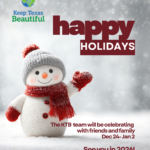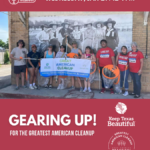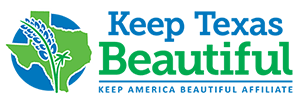Robert Brischetto — Medina, Texas
About the Project
This storytelling project, led by Jazmin Storrs through her internship with Mobilize Green, offers a human perspective to the environmental challenges shaping life across Texas. From the Panhandle to South Texas, from coastal towns to Hill Country communities, interviews capture how people experience heat, drought, hurricanes, floods, and strong winds in their own backyards. Too often, these realities are contained in statistics, while the lived stories remain unheard. By centering personal voices, the project reminds us that whether facing storms, droughts, or flooding, we are bound by a common thread: our humanity. Each story calls us to listen with empathy, see beyond the data, and recognize that caring for the environment is inseparable from caring for one another.
A Community Lens on Environmental Change
by Jazmin Storrs
In Bandera County, Bob Brischetto spent 20 years uniting people around the Medina River. Now he’s focused on reshaping the culture of care we bring to the land.

About Robert Brischetto
Robert Brischetto, a retired sociology professor in Bandera County, founded the Medina River Cleanup in 2001 to unite canoe groups from across Texas in protecting the river. After its suspension due to COVID-19 and drought, he launched “Don’t Make Waste Bandera” to continue promoting environmental responsibility. He advocates for cultural change and sustainable practices through community action and the Texas River Protection Association.

A River that Brought People Together
For two decades, the Medina River wasn’t just a natural resource, it was a gathering place. The annual Medina River Cleanup became a beloved tradition that blended service, celebration, and community spirit.

Canoes of volunteers paddling along the Medina River, collecting trash during the annual cleanup event.

Volunteers gather after the cleanup, enjoying a barbecue meal together in celebration.
”The river became to us a way of drawing people together, to try to protect their environment, to enjoy the river.
“We were already bringing in 220 people for the river cleanup once a year for an all-day event to clean up the river. We provided barbecue tacos in the morning and lunch sausage, and in the evening, a three-meat barbecue. It became an event that attracted people, canoe groups from San Antonio, but also Austin and Dallas and Fort Worth and Houston,” Bob shared. “They all came together. Scouts from San Antonio and nearby areas would pitch their tents the night before, ready for the cleanup on the first Saturday in May. That’s what we did for 20 years, until COVID. The river became to us a way of drawing people together, to try to protect their environment, to enjoy the river.”

Volunteers gather for a group photo to commemorate the Medina River Clean Up in 2015
What impacts have you observed in your environment?
“The lake used to come right up to our backyard. When it was full, it was 75 feet deep. For a while, this became our full-time home, and we loved being out on the water. We had a sailboat, a pontoon boat, and spent a lot of time canoeing. The river runs were the best part. But watching all of that disappear—it really changed the character of the whole community.”
How has this affected your community?
“People stopped coming back to their lakefront homes because there was no lake to swim in, no river to paddle. The recreational aspect of the community faded. Businesses that depended on the water, like lakeside restaurants and the local kayak trainer, shut down. When I look out from my back deck now, there’s no water, just a field. We still hike it and enjoy the open plains, but it isn’t a lake, we lost that.”

Residential docks at Medina Lake, comfortably afloat when the lake is nearly full, sit on dry land in late May.
Responding to the Situation
With no river left to clean up, Brischetto turned his attention to the land. The loss of the lake inspired a new kind of stewardship that focused on the people and places still in need of care.
“We formed these nonprofits to fill the gap we saw after moving to a rural area. One of them, called Don’t Make Waste Bandera, focuses on helping people who can’t clean up their yards. Some are elderly, some are disabled, and others simply can’t afford it. We organize volunteers to go in and clear the property. So far, we’ve completed about 27 of these cleanups.”

Volunteers from Don’t Make Waste Bandera continue their efforts by picking up trash throughout local areas.
Why Care for the Environment?
“I’m a sociologist, so I look at how people view their environment and how they live in that environment in a way that is going to be beneficial to others. We need a community outlook. That is, we’ve got to have people look not just at what’s good for me, but what is it that’s good for all of us? How can we help one another reach our community goals—keeping things clean, protecting the environment, and preserving what we have? It is truly something where you have to work on the psychology and the cultural outlook that people have.”

Bob Brischetto kayaking down the Medina River
Call to Action
Understanding the cause is just the beginning. Brischetto highlights that real change requires reimagining our systems and finding new ways to protect what we share.
“Eventually, it has to reach the companies producing plastic. We need to think beyond reusing, we need to stop using plastic altogether. Right now, only about 5 percent of plastics in the U.S. actually get reused. There are some countries where they figured out ways of reusing the materials that are recycled, and reusing things that are thrown away.”
This sense of responsibility, he adds, also means acknowledging the deeper forces at play in local environmental impacts.
“We have to acknowledge that climate change plays a major role. The drought we’ve seen is part of a larger pattern of extreme weather.”

Bob Brischetto joins two volunteers in picking up trash along the riverbank.
Hopes for the Future
For Brischetto, the future isn’t just about preserving the land, it’s about passing on the responsibility to the next generations.
“I’m going to keep going until I’m kicking up daisies. My hope is to get others involved, especially young people, so they can carry this forward and stay engaged in conservation and protection.”

Jazmin Storrs
Jazmin Storrs is a student at the University of Texas at Austin, double majoring in International Relations and Humanities Honors, where she has designed a concentration titled Climate Policy, Human Rights, and the Media. As a Rapoport Community Service Scholar, Jazmin is recognized for her public service. She works as an Election Clerk to support voter access and recently traveled to Washington, D.C. to advocate for underserved communities.
As a Mobilize Green Intern, Jazmin supports Keep Texas Beautiful by leading storytelling on Texans’ environmental experiences. She is also the Climate Lead for UN Young Professionals and Vice Chair for Central Texas Model United Nations.
A violinist of over ten years, Jazmin earned 1st place at the 2022 New York National Orchestra Cup and performed at the International Midwest Clinic in 2023. Passionate about humanizing climate policy, Jazmin is dedicated to ensuring that everyday voices are represented in institutional spaces.


